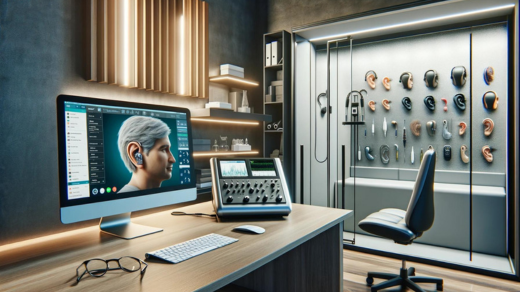1. Introduction to Teleaudiology Teleaudiology is a revolutionary field in audiology that utilizes telecommunications technology to provide remote audiological services. It encompasses assessments, diagnostics, rehabilitative interventions, and counseling for individuals with hearing impairments.
2. The Evolution of Audiology Equipments Audiology equipments have undergone significant advancements over the years, evolving from basic hearing aids to sophisticated diagnostic tools. These equipments play a crucial role in the assessment and management of hearing disorders.
3. Understanding Teleaudiology Services Teleaudiology services offered by Apollotelehealth enable patients to access audiological care from the comfort of their homes. Through telecommunication platforms, audiologists can conduct assessments, provide consultations, and adjust hearing aids remotely.
4. Benefits of Teleaudiology The adoption of teleaudiology offers numerous advantages, including improved accessibility to audiological care, reduced travel time and costs for patients, and enhanced convenience in scheduling appointments.
5. Overcoming Barriers to Access Teleaudiology addresses geographical barriers by reaching individuals in remote or underserved areas where traditional audiological services may be limited. It also caters to populations with mobility issues or transportation constraints.
6. Ensuring Quality Care Despite the remote nature of teleaudiology, Apollotelehealth ensures the delivery of high-quality care through the use of advanced audiological equipments and adherence to professional standards and protocols.
7. Remote Assessments Audiological assessments conducted via teleaudiology platforms involve various tests to evaluate hearing sensitivity, speech recognition, and auditory processing abilities. These assessments aid in diagnosing hearing disorders and determining appropriate interventions.
8. Diagnostic Capabilities Modern audiology equipments facilitate accurate diagnosis of hearing impairments, including audiometers for pure-tone testing, tympanometers for middle ear assessments, and otoacoustic emission analyzers for cochlear function evaluation.
9. Rehabilitation and Intervention Teleaudiology enables audiologists to remotely provide rehabilitative services, such as hearing aid fittings, programming adjustments, auditory training, and counseling on hearing conservation and communication strategies.
10. Hearing Aid Technology Advancements in hearing aid technology have revolutionized the management of hearing loss, with features such as digital signal processing, directional microphones, and wireless connectivity enhancing the functionality and user experience of hearing aids.
11. Remote Hearing Aid Fittings With teleaudiology, individuals can undergo hearing aid fittings and adjustments without the need for in-person visits to the clinic. Audiologists can remotely adjust hearing aid settings based on patient feedback and performance assessments.
12. Telemonitoring and Follow-up Care Apollotelehealth offers telemonitoring services to remotely track the usage and performance of hearing aids. This allows audiologists to provide timely interventions and follow-up care, ensuring optimal hearing outcomes for patients.
13. Accessibility for Special Populations Teleaudiology extends audiological services to special populations, including children, older adults, and individuals with disabilities, who may face challenges in accessing traditional healthcare facilities.
14. Patient Education and Support Through teleaudiology platforms, Apollotelehealth provides educational resources and support materials to empower patients in managing their hearing health. This includes guidance on hearing aid maintenance, communication strategies, and coping mechanisms.
15. Collaboration and Consultations Teleaudiology facilitates collaboration among healthcare professionals, allowing audiologists to consult with otolaryngologists, speech-language pathologists, and other specialists to optimize patient care and outcomes.
16. Data Security and Privacy Apollotelehealth prioritizes data security and privacy to ensure the confidentiality of patient information transmitted during teleaudiology consultations. Robust encryption protocols and compliance with healthcare regulations safeguard sensitive data.
17. Regulatory Compliance Teleaudiology services offered by Apollotelehealth adhere to regulatory guidelines and standards set forth by relevant healthcare authorities, ensuring compliance with laws governing telehealth practice and patient care.
18. Teleaudiology in a Post-Pandemic Era The COVID-19 pandemic has accelerated the adoption of teleaudiology as a safe and convenient alternative to traditional audiological services. Its continued integration into healthcare systems is anticipated even beyond the pandemic.
19. Addressing Technological Challenges While teleaudiology offers tremendous potential, it also presents challenges such as technological limitations, internet connectivity issues, and disparities in access to digital infrastructure. Strategies to address these challenges are essential for ensuring equitable access to care.
20. Future Directions in Teleaudiology The future of teleaudiology holds promise for further innovations, including the integration of artificial intelligence for automated audiometric testing, virtual reality simulations for auditory training, and remote cochlear implant programming.
21. Professional Development and Training Audiologists engaging in teleaudiology undergo specialized training to effectively utilize telecommunication technologies, adhere to ethical standards, and navigate legal and regulatory considerations associated with remote practice.
22. Patient Satisfaction and Outcomes Research indicates high levels of patient satisfaction with teleaudiology services, citing convenience, accessibility, and the quality of care provided by Apollotelehealth as key factors influencing positive outcomes.
23. Teleaudiology and Healthcare Equity Teleaudiology has the potential to address disparities in access to audiological care, particularly among marginalized and underserved populations, by overcoming barriers related to geography, socioeconomic status, and disability.
24. Advocacy for Teleaudiology Integration Advocacy efforts are underway to promote the integration of teleaudiology into mainstream healthcare systems, advocating for policy changes, reimbursement parity, and investment in telecommunication infrastructure.
25. Embracing the Future of Audiology In conclusion, teleaudiology represents a paradigm shift in audiological practice, offering transformative opportunities to enhance access, efficiency, and quality of care. With Apollotelehealth leading the way, the future of audiology is indeed promising, as we continue to leverage technology to improve the lives of individuals with hearing impairments.

